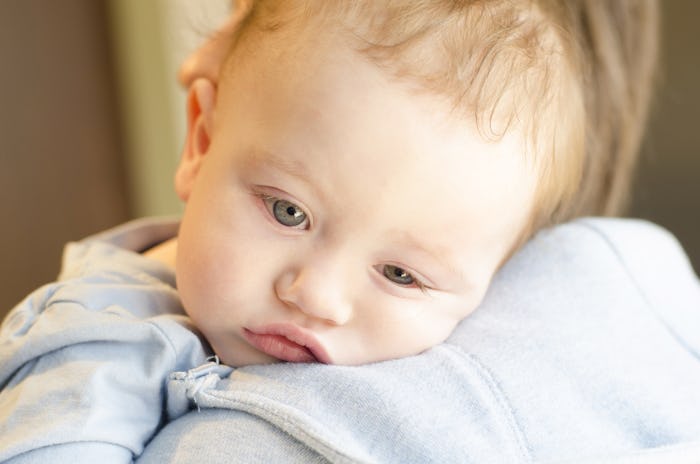Life
Here's What Pediatricians Want You To Do If Your Baby Gets The Nasty Stomach Flu
Want to know my natural response to someone asking me what I would do if my baby got the stomach flu? I would hand her to my partner and run for the hills. There's only one thing worse than suffering from the stomach flu, and that's watching your little ones suffer, especially before they even know what's wrong. Since running for the hills is not something a medical professional would recommend as a course of action, you'll want to know what to do if your baby gets the stomach flu, and when to worry.
One of the main dangers of the stomach flu for babies and young children, according to Dr. Laura Benjamins, Associate Professor of Pediatrics & Adolescent Medicine at University of Texas Medical School in Houston, is dehydration. She elaborates, "If a child is becoming lethargic, has a sunken fontanel, high fevers, or not making wet diapers, they should be seen by a doctor."
The Mayo Clinic explained that the stomach flu, or viral gastroenteritis, usually consists of symptoms like watery diarrhea, abdominal pain, nausea and vomiting, muscle aches, and a low-grade fever. These symptoms can last between 2 and 10 days, they said.
Dr. Benjamins reassures parents that their baby usually needs support — and for you to count their wet diapers. "They may not have much of an appetite for a few days, but as long as they are drinking enough to make at least three wet diapers a day and still have tears and moist mucus membranes, we just need to support them until it passes."
Of course, that's sometimes easier said than done and might even involve a little help. "If the vomiting or diarrhea is a lot then they may also need some electrolyte replacement. You can use Pedialyte or make your own oral rehydration solution," says Dr. Benjamins. "Gatorade is OK, but the high sugar can sometimes can make diarrhea worse. You want to avoid juice and other high sugar products. You can take a medicine syringe and do 5 [mL] every few minutes to help minimize vomiting."
Because your baby is too young to explain his or her symptoms clearly to you, you'll want to be on the look out for other signs of dehydration as well. If your baby has bloody diarrhea or vomiting that lasts longer than a few hours, head to your doctor or at least give them a call, advised Parents.
If your baby is younger than 6 months old, a fever can be especially dangerous, they explained. In this case, call your doctor if your baby has a fever over 101 degrees. Additionally, if your baby is under the age of 3 months old and has a fever of 100.4 degrees, you'll want to call the doctor or nurse help line to find out if you should have your baby checked for a more serious infection.
Breastfeeding basics explained that formula-fed babies should take a break from formula because the lactose or soy components can aggravate the stomach even more. However, breastfed babies don't need to adhere to this stipulation: "Breastmilk is closer to a clear fluid than either dairy or soy based formula. It not only provides your baby with the immune factors unique to human milk, but it also is digested so quickly that even if your baby spits it right back up or poops it out, some of it is digested first."
Finally, if your baby comes down with the stomach flu, start washing your hands and sanitizing surfaces, because if there's one thing that's certain about the stomach flu, it's that it spreads like wildfire.
In the meantime, there's no much you can do to expedite recovery, so buckle up and keep a close eye on your little one. They're going to need extra snuggles tonight.
Check out Romper's new video series, Bearing The Motherload, where disagreeing parents from different sides of an issue sit down with a mediator and talk about how to support (and not judge) each other’s parenting perspectives. New episodes air Mondays on Facebook.
